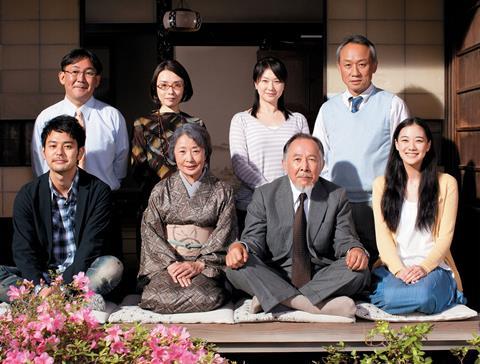Dir: Yoji Yamada. Japan. 2012. 146mins

Whether a remake, a tribute or an update of Yasujiro Ozu’s Tokyo Story - admittedly one of the greatest cinema achievements ever - Yoji Yamada’s new variation of that masterpiece is bound to disturb any self-respecting cinephile. Arriving 60 years after the premiere of the original and celebrating the 50th anniversary of Ozu’s death,
In Tokyo Family (Tokyo Kazoku), some of the performances verge on caricatures.
Ozu’s visual precision and inimitable selection of shots, his masterful restraint, the profound wisdom behind his quiet acceptance of life for what it is and the sad disappointment with the shortcomings of human nature, doesn’t survive in Yamada’s take of the story and it is difficult not to wonder why Shochiku, which brought out the original in 1953, could think that it needed to be spruced up today.
The story is basically the same, though, since the action takes place now in the 21st century, some changes were inevitable. For instance, no son is lost in the WW2 and therefore, the angelic daughter-in-law is replaced by the future wife of the youngest son. But that is not the main point. As a matter of fact, there are rumors that Leo McCarey’s depression drama Make Way for Tomorrow (1937) inspired Ozu, and that film was an adaptation of a play based on a novel. But while the novel, the play and the American film are long forgotten, Ozu’s film has not only survived and continues to be acclaimed.
An old retired couple, Shukichi Hirayama (Isao Hashizume) and his wife, Tomiko (Kazuko Yoshyuki,) come from their island near Hiroshima, to visit their children in Tokyo. The oldest son, Koichi (Masahiko Nishimura) is a doctor, his sister Shigeko (Tomoko Nakajima) runs a beauty parlor and the youngest, Shoji (Satoshi Tsumabuki), is a stagehand working in the theatre. None of them has any time to spare for the parents, and try, with various degrees of courtesy, to get rid of the unwanted burden.
On the eve of their return home, the mother dies (this is no spoiler, the Ozu film is too well known to keep the plot secret), and after the obligatory five minutes of mournful expressions, everyone goes back to his life, with the exception of the youngest son’s fiancée, Noriko (Yu Aoi), who shows more feeling for the bereaved father than all of his children.
In Tokyo Family (Tokyo Kazoku), some of the performances verge on caricatures – Tomoko Nakajima’s Shigeko for one – and only few seem to be really inspired, with Kazuko Yoshiyuki and Yu Aoi offering warm, sincere, efforts. But again – as unfair as it may seem but inevitable in these circumstances – how can anyone expect to match the unique qualities of Ozu’s favorite actor, Chishu Ryu, in the role of the father or the luminous presence of Setsuko Hara, probably the only outright saintly character in Ozu’s film, as the widowed daughter-in-law devoted to the parents of her late husband.
To underline this is no longer post-war Japan, Yamada throws in all sorts of contemporary landmarks, skyscrapers, bullet trains, mentions of the Fukushima disaster and a short reference to the downbeat outlook of the future – in contrast to the optimistic mood of the fifties – all of this probably implying that the world has changed but human nature has not. But maybe it has. It’s less interesting now than it used to be.
Production company: Sochiku
International Sales: Shochiku, www.shochiku.co.jp
Producers: Hiroshi Fukasawa, Takashi Yojima
Screenplay: Yoji Yamada, Emiko Hiramatsu
Cinematography: Masashi Chikamori
Editor: Iwao Ishii
Production designer: Mitsuo Degawa
Music: Joe Hisashi
Main cast: Isao Hashizume, Kazuko Yoshyuki, Masahiko Nishimura, Tomoko Nakajima, Satoshi Tsumabuki, Yu Aoi





















